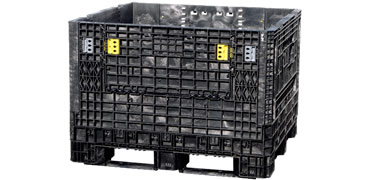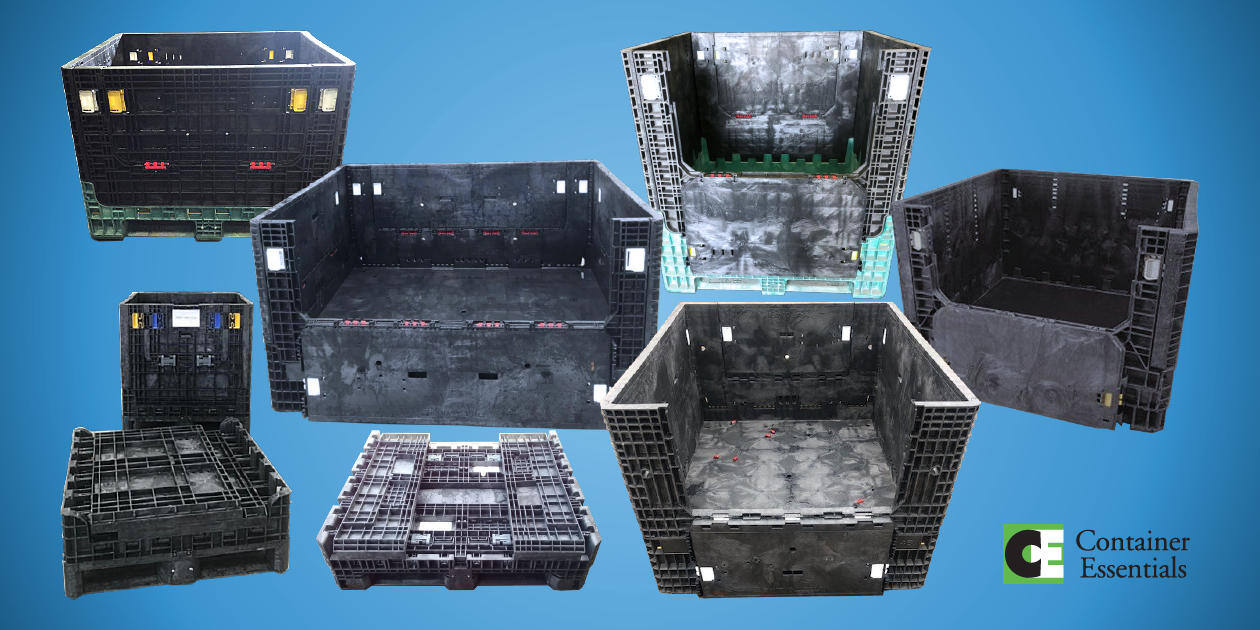The Ultimate Guide to Selecting the Right Bulk Containers for Your Organization Needs
Choosing the suitable bulk containers is important for any company that relies upon effective logistics. Different sorts of containers exist, each developed for specific products and applications. Elements such as size, product compatibility, and governing requirements play a substantial role in this decision-making procedure. Recognizing these aspects can bring about improved operational efficiency. Numerous organizations neglect crucial aspects that might enhance their general performance and sustainability. What are these factors to consider?
Recognizing Different Kinds Of Mass Containers
Mass containers act as important tools for services looking for effective storage and transport remedies. These containers are available in numerous kinds, each created to satisfy certain operational requirements. One usual kind is the intermediate mass container (IBC), which is optimal for liquid and granulated products, offering an equilibrium of ability and ability to move. Another prominent alternative is the mass bag, or FIBC, suitable for dry, flowable items. These versatile containers are light-weight and can be quickly delivered and stored. For much heavier products, inflexible mass containers are typically utilized, providing toughness and stability for secure handling. Furthermore, there are specialized containers tailored for harmful products, making sure conformity with security guidelines. Recognizing the distinct qualities of these bulk container types allows organizations to make enlightened choices that optimize logistics and decrease expenses. By picking the ideal container, business can enhance their operational effectiveness and enhance their supply chain processes.
Key Material Factors To Consider for Bulk Containers
When choosing mass containers, it is necessary to consider the materials made use of in their construction. Aspects such as resilience, chemical, and strength compatibility play a crucial function in making sure the containers fulfill details operational requirements. Furthermore, weight and mobility worries can affect both performance and transportation logistics.
Material Longevity and Toughness
Sturdiness and stamina are essential consider selecting products for mass containers, as they directly affect the container's capacity to hold up against various environmental conditions and handling processes. Materials such as high-density polyethylene (HDPE), polypropylene, and stainless-steel are typically favored for their robust homes, supplying resistance to impact, abrasion, and temperature fluctuations. The selection of product likewise influences the total lifespan of the container; stronger materials normally lead to less regular replacements, leading to set you back savings in time. In addition, the weight of the product can affect shipping expenses and convenience of handling. Organizations must consider their details operational atmospheres and the capacity for deterioration to guarantee peak toughness and stamina in their mass container choice.
Chemical Compatibility Factors
Recognizing chemical compatibility is essential for selecting bulk containers, as the products utilized should withstand the details compounds they will certainly hold. Different variables affect compatibility, including the chemical nature of the materials, temperature, and duration of storage. For example, corrosive chemicals may call for containers made from stainless-steel or specialized plastics that resist destruction. Furthermore, reactive materials can generate heat or gases, requiring vented or pressure-rated containers. The selection of container material, whether polyethylene, steel, or polycarbonate, must straighten with the chemical residential or commercial properties of the saved substances to avoid leaks or breaches. Ultimately, a detailed assessment of these compatibility variables ensures safe handling and storage, shielding both personnel and the environment while keeping product integrity.
Weight and Transportability Concerns
Picking mass containers entails not just evaluating chemical compatibility but likewise thinking about weight and mobility. Companies must evaluate the ease of handling and transportation to optimize performance. Lightweight products like high-density polyethylene (HDPE) or light weight aluminum can facilitate simpler motion and reduce delivery expenses. On the other hand, heavier containers might supply boosted longevity but can prevent movement, especially in atmospheres needing regular moving. Additionally, the design of the container need to enable for hassle-free lifting and piling, making sure ergonomic safety and security for employees. Firms need to additionally consider the infrastructure available for transportation; as an example, containers compatible with forklifts or pallet jacks can improve operations. Eventually, the ideal balance in between weight and transportability straight affects operational effectiveness and cost efficiency.
Sizing Your Mass Containers for Ideal Effectiveness
When sizing bulk containers, organizations should very carefully assess the dimensions needed to suit their details products. Furthermore, weight ability is a critical element that influences effectiveness and security throughout transportation and storage space. Effective sizing not just maximizes space but also maximizes functional operations.
Figuring Out Container Capacities
Choosing the appropriate measurements for mass containers is vital for making best use of effectiveness in storage space and transportation. Businesses should evaluate their certain needs, taking right into account elements such as available area, the nature of the items being saved, and the methods of transport utilized. Exact measurements ensure that containers fit preferably in cars and stockrooms, reducing lost room and lowering dealing with time. Requirement sizes can use ease, yet custom-made measurements may be necessary for special demands or to accommodate specific items. In addition, it is necessary to examine stacking capabilities and access, as these aspects affect overall functional efficiency. Ultimately, the ideal dimensions lead to boosted company and streamlined logistics, profiting the overall productivity of the service.
Weight Ability Considerations
Comprehending weight capability is important for organizations aiming to optimize their bulk container efficiency. The weight capability of a container straight impacts storage space capabilities, transportation logistics, and overall operational expenses. Choosing containers with the proper weight restrictions guarantees that organizations can securely store and carry their items without risking damage or compliance problems. Overwhelming containers can result in structural failings, while underutilizing capacity cause thrown away resources. When picking containers, it is important for organizations to examine their product weights and consider any type of regulative requirements. Additionally, variables such as the type of product, meant usage, and ecological problems must additionally affect weight capability choices. By reviewing these aspects, services can boost performance and guarantee a streamlined supply chain.
Governing Conformity and Safety Standards

Governing compliance and security standards play an important function in the choice of bulk containers for organizations. Organizations must assure that their containers fulfill different guidelines established by local, national, and global authorities. These standards often relate to product safety and security, structural integrity, and proper labeling, which assist prevent accidents and assure the secure transport of products.
Additionally, adherence to industry-specific standards, such as those from the Fda (FDA) or the Occupational Security and Health And Wellness Administration (OSHA), is critical for firms dealing with harmful materials or food items. Non-compliance can lead to penalties, lawful concerns, or damage to a company's credibility.
Businesses ought to likewise take into consideration the container's compatibility with the products being kept or moved to stay clear of contamination or chain reaction (used collapsible containers). To summarize, comprehending and executing regulatory conformity and safety criteria is vital for the responsible and effective usage of mass containers
Sustainability Choices for Eco-Friendly Bulk Containers

Firms are additionally discovering choices made from recycled materials, which not only save sources however additionally sustain the recycling industry. Moreover, advancements in layout permit for lighter containers that call for less energy to transport, better improving sustainability. By integrating these green mass container options, services can demonstrate their dedication to ecological stewardship while satisfying customer demand for lasting techniques. This change not only aids the planet however can additionally improve brand reputation and consumer loyalty.
Cost-Effectiveness and Budgeting for Bulk Containers
While many organizations concentrate on sustainability, cost-effectiveness stays a critical factor when choosing mass containers. Organizations should examine the preliminary purchase cost, in addition to long-term functional prices, to guarantee financial feasibility. Aspects such as upkeep, longevity, and reusability play a substantial duty in figuring out overall costs.
Buying top quality containers may produce higher ahead of time costs however can bring about savings with minimized replacement prices and decreased waste. Additionally, businesses need to consider transport prices and storage performance, as these can influence the general budget.

Often Asked Inquiries
How Do I Establish the Right Container for Hazardous Products?
To determine the right container for hazardous products, one have to evaluate compatibility with the substance, think about the container's material, check for governing compliance, and examine ability and security functions to assure appropriate handling and storage.
Can Bulk Containers Be Personalized for Specific Products?
Yes, bulk containers can be tailored for details get more info items. used bulk containers. Numerous functions, such as layout, material, and dimension, can be tailored to meet distinct requirements, making certain suitable safety and security and effectiveness for delivering and saving various items
What Is the Average Life-span of Different Bulk Container Types?
The typical life expectancy of bulk container kinds differs; plastic containers last 5-10 years, steel containers 10-20 years, and wooden containers typically last 3-7 years, relying on usage, upkeep, and environmental conditions.
Exactly how Should I Tidy and Maintain Bulk Containers?
To clean and keep bulk containers, one need to frequently check for damages, eliminate residue, wash with ideal detergents, rinse extensively, and warranty proper drying before storage. Adhering to supplier guidelines improves durability and safety throughout usage.
Are There Rental Options for Bulk Containers Available?
Yes, countless companies supply rental options for mass containers, supplying flexibility for companies. These leasings can accommodate different demands, permitting companies to manage stock effectively without the dedication of purchasing containers outright.
Durability and strength are vital factors in picking materials for mass containers, as they straight influence the container's capacity to endure various ecological problems and dealing with processes. Understanding chemical compatibility is essential for selecting bulk containers, as the materials utilized need to withstand the certain compounds they will hold. Understanding weight capacity is important for services aiming to optimize their bulk container performance. Regulatory compliance and safety and security standards play an important duty in the option of bulk containers for services. While many businesses focus on sustainability, cost-effectiveness continues to be an essential factor when choosing bulk containers.